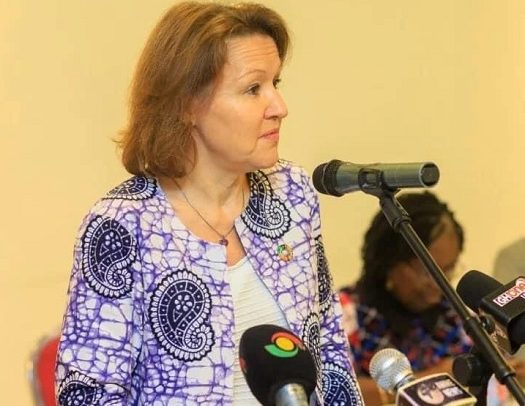Anne-Claire Dufay
The United Nations Children’s Fund (UNICEF) Country Representative in Ghana, Anne-Claire Dufay, has urged government to intensify efforts at ending all forms of gender-based violence against women and children, and harmful practices such as child marriage.
She has also called for the need for government to ensure the alignment of several existing laws with international conventions that the country acceded to, including the Convention on the Rights of Persons with Disabilities, as well as the passage of the Affirmative Action Bill.
She was speaking at the opening of a two-day workshop for the validation and submission of Civil Society Organisations (CSO’s) shadow reports under the UN Universal Periodic Review (UPR) Mechanism-Ghana 4th cycle.
The workshop organized by the POS Foundation with funding from the Netherlands Embassy, Ghana was to review, finalize and validate shadow reports developed by CSOs operating under the various Human Rights thematic areas and to submit these reports to the UN HRC for the upcoming UPR session this month.
Madam Dufay noted that although Ghana has made significant progress in promoting human rights, inclusion and equality for all, much more still needs to be done.
She indicated that the United Nations is currently compiling inputs into the UPR, which would serve as a useful reference point, in addition to the CSO reports as Ghana seeks to build on its record and stay strong on the Continent in relation to human rights.
Netherlands Ambassador to Ghana, Jeroen Verheul, in an address also stressed the need for Ghana to ensure that laws promulgated, and instruments ratified are implemented to safeguard, protect and promote human rights in the country.
According to him, Ghana has come far on human rights as it has ratified several international human rights instruments and protocols and has also promulgated local laws to safeguard fundamental human rights, but it can do more by ensuring their implementation.
He said “over the previous UPR cycles, the number of recommendations accepted by Ghana has increased. From the statistics, Ghana accepted 123 recommendations in 2012 and 212 recommendations in 2017. Whiles acceptance of the recommendations is important, implementation of same constitutes a prerequisite for successful results in tangible human rights improvement in the country”
Mr Verheul some of the recommendations have also almost become repetitive over the various cycles since 2008, and this was again due to non-implementation of accepted recommendations, adding that a focus on implementation would avoid this situation.
He said commended government for the respect it attaches to human rights, which goes hand in hand with the strong democratic credentials Ghana was known for and urged participants to re-examine earlier reports and compliance with recommendations issued to Ghana in the prior cycles to ensure that the recommendations for the upcoming cycle were better articulated, more specific and implementable.
Prof. Takyiwaa Manuh, from the University of Ghana said the UPR process was an important factor for change and for human rights to be advanced, there is the need for a whole societal approach because it affects all spheres of life.
“Human rights issues affect all and as such should be the concern of all especially now that it is being violated all the time.
The executive arm of government, members of parliament and the judiciary must be interested and playing their respective roles in order to protect the human rights of all in order to improve the human rights records of the country”, she added.
BY Gibril Abdul Razak

